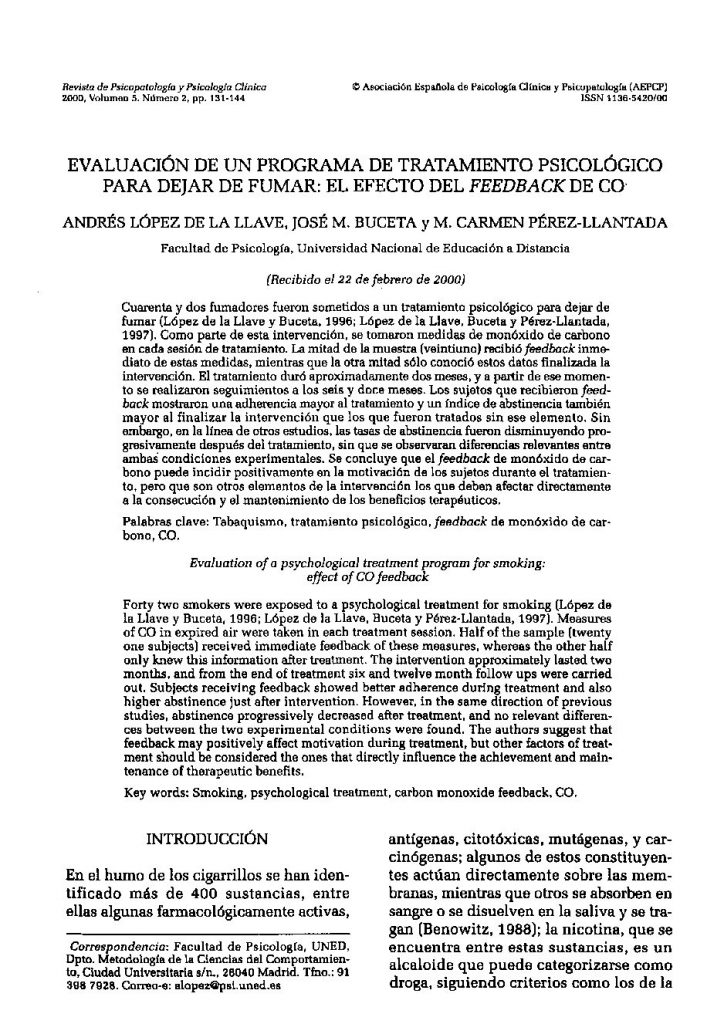Evaluación de un programa de tratamiento psicológico para dejar de fumar: el efecto del feedback de CO.
Evaluación de un programa de tratamiento psicológico para dejar de fumar: el efecto del feedback de CO.

- Comisión Nacional de Psicología Clínica Conclusiones del I Encuentro Nacional de Tutores de Formación Especializada en Psiquiatría y Psicología Clínica.
- Estímulos verbales asociados a hipocondría.
- El pesimismo defensivo y el síndrome del impostor: análisis de sus componentes afectivos y cognitivos.
- Evaluación de un programa de tratamiento psicológico para dejar de fumar: el efecto del feedback de CO.
- ¿Cómo somos, en qué ocupamos nuestro tiempo y cuán felices nos sentimos?.
Forty four smokers were exposed to a psychological treatment for smoking (López de la Llave y Buceta, 1996; López de la Llave, Buceta y Pérez-Llantada, 1997). Measures of CO in expired air were taken in each treatment session. Half of the sample (twenty one subjects) received immediate feedback of these measures, whereas the other half only knew this information after treatment. The intervention approximately lasted two months, and from the end of treatment six and twelve months follow ups were carried out. Subjects receiving feedback showed better adherence during treatment and also higher abstinence just after intervention. However, in the same direction of previous studies, abstinence progressively decreased after treatment, and no relevant differences between the two experimental conditions were found. The authors suggest that feedback may positively affect motivation during treatment, but other factors of treatment should be considered the ones that directly influence the achievement and maintenance of therapeutic benefits.
Cuarenta y dos fumadores fueron sometidos a un tratamiento psicológico para dejar de fumar (López de la Llave y Buceta, 1996; López de la Llave, Buceta y Pérez-Llantada, 1997). Como parte de esta intervención, se tomaron medidas de monóxido de carbono en cada sesión de tratamiento. La mitad de la muestra (veintiuno) recibió feedback inmediato de estas medidas, mientras que la otra mitad sólo conoció estos datos finalizada la intervención. El tratamiento duró aproximadamente dos meses y a partir de ese momento se realizaron seguimientos a los seis y doce meses. Los sujetos que recibieron feedback mostraron una adherencia mayor al tratamiento y un índice de abstinencia también mayor al finalizar la intervención que los que fueron tratados sin ese elemento. Sin embargo, en la línea de otros estudios, las tasas de abstinencia fueron disminuyendo progresivamente después del tratamiento, sin que se observaran diferencias relevantes entre ambas condiciones experimentales. Se concluye que el feedback de monóxido de carbono puede incidir positivamente en la motivación de los sujetos durante el tratamiento, pero que son otros elementos de la intervención los que deben afectar directamente a la consecución y el mantenimiento de los beneficios terapéuticos.



